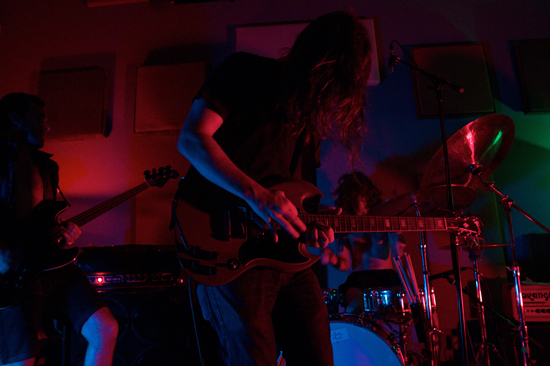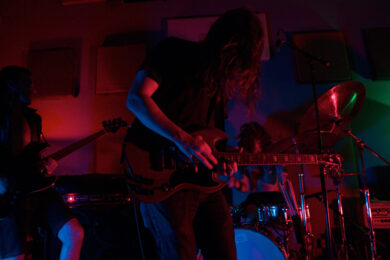More than any other metal subgenre in the last decade, black metal has consistently bred interesting new bands with radical visions for its future. It’s as though its top purveyors have collectively refused to stagnate after that long honeymoon of complacency that followed the creative explosion of the Norwegian Second Wave. Unfortunately, also more than any metal subgenre, its diehard fan base rejects the very change that has been its calling card these past ten years – or at least rejects the notion of bands operating outside of the arbitrary boundaries of ‘true black metal’.
It’s gotten so bad that an effective new way to discover a great black metal band formed in the last decade is to simply find a band that the internet’s self-appointed black metal magistrates have deemed false. In recent years, the likes of Alcest, Cobalt, and even Watain have drawn the ire of the black metal elite for varying but ultimately unclear reasons, but I’ve never seen them disparage a band within their own preferred genre quite like they’ve attacked Liturgy. The Brooklyn four-piece, you see, has committed a crime far worse than any other possible transgression for a black metal band: they’re hipsters. Varg Vikernes may be an anti-Semitic convicted murderer, but at least he doesn’t wear a v-neck.
In the detractors’ defence, the infamous Scion Rock interview they tend to base their anti-Liturgy arguments upon is pretty painful to watch. In it, frontman Hunter Hunt-Hendrix comes off as dismissive of his genre’s history and smugly self-satisfied with his own ebullient rejection of darkness and negativity. It’s in his body language as much as his words. He smirks when he drops high-concept ideas and big words, and even the way he sits in his chair with an air of superiority grates. By the time he starts discussing the “manifesto” he wrote for the make-believe genre of transcendental black metal even the staunchest Liturgy apologists will likely find themselves nervously looking at the floor and inching toward the nearest exit. By the end of the interview, Hunt-Hendrix isn’t even saying anything. Words tumble from his mouth but meaning doesn’t follow; he’s just wallowing in a self-drawn bath of pretentious nonsense.
Imagine my surprise, then, when I met Hunt-Hendrix before Liturgy’s show at Russian Recording in Bloomington, Indiana last Friday and found that he was shy, awkward, and, dare I say, humble. I went to the merch table to pick up a copy of the excellent Aesthethica LP – the seventeenth best album of 2011 thus far, in our estimation – and the Liturgy mainman seemed genuinely appreciative that I wanted to buy his music, that I enjoyed it, and that I was there to write about his show. None of the guy stumbling through elementary philosophy with a pompous tone in that Scion video was present in the Hunter Hunt-Hendrix I met. People behave differently with a camera in their face, and nothing about my encounter with this YouTube commenter-dubbed hipster/poseur/faggot indicated that he was anything but a gracious black metal musician happy to be able to tour and bring his music to receptive audiences. And bring it he did.
After a surprisingly solid support set from apparent Mr. Bungle thralls Dope Body, Liturgy took to the stage and promptly commenced to pummeling everything in sight. After opening with a blistering rendition of ‘Pagan Dawn’ – the only song they’d play from debut LP Renihilation – Bernard Gann stopped to replace a string on his guitar, and instead of filling the silence with the usual awkward stage banter, Hunt-Hendrix built a meandering series of riffs on the spot, joined eventually by bassist Tyler Dusenbery and drummer Greg Fox. Once Gann got his guitar restrung and retuned, there was no pause between Hunt-Hendrix’s improvisation and the second song of the set, ‘High Gold’ – everyone simply made eye contact, nodded, and launched into it. This was the first of many crucial moments in Liturgy’s domination of that tiny Bloomington house venue.
The rest of the evening flew by far too quickly. Flawless performances of ‘Generation’, ‘Sun of Light’, ‘Returner’, ‘Veins of God’, and ‘Glory Bronze’ rounded out Liturgy’s 45-minute headlining set, and the enamoured crowd, in return, paid meet adoration to their household gods. The quartet’s tightness, as if it wasn’t proven enough by the early broken string incident, was made incredibly evident as they blazed through songs with light speed tempos and odd time signatures without falling out of step with one another for even a second. It’s difficult to produce distinct twin guitar harmonies when every other riff is tremolo-picked, but Hunt-Hendrix and Gann somehow manage, and the lockstep rhythm section not only keeps up with the fretboard pyrotechnics but often shines in its own right. On the whole, Liturgy may be the most technically impressive band in black metal today. Even more fuel for the corpsepainted haters, I suppose.
Being a part of a Liturgy audience in 2011 isn’t quite the same as seeing black metal’s torch passed to a new generation, but only because the passing of a torch implies a replacement of the old guard. As long as young bands like Wolves in the Throne Room and Altar of Plagues keep offering relatively conventional but undeniably brilliant observations on the genre, that won’t happen. Instead, to witness what these Brooklyn natives bring to the stage is to see yet another transmutation of a genre that is more creatively fertile than any other in metal, and one that has room for all the radical freethinkers and transcendentalists and whoever else has some tangential interpretation of what it can and should be. The best time to be a black metal fan was not in 1993 in a basement in Oslo; it’s right now, all over the world. The darkness breeds more darkness, but it also breeds light. An abyss spits out another abyss. Long live Liturgy, and long live black fucking metal, whatever form it may take.



